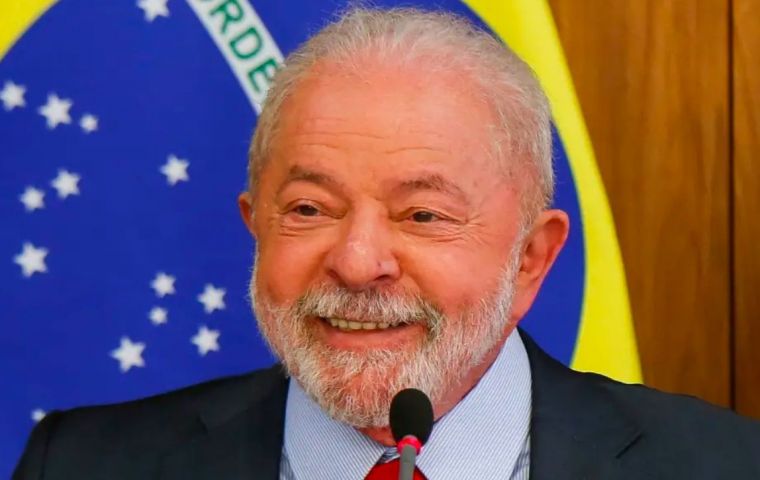MercoPress. South Atlantic News Agency
Environmental commitments key to people's well-being, Lula tells ILO
 “The invisible hand of the market only exacerbates inequalities,” Lula stressed
“The invisible hand of the market only exacerbates inequalities,” Lula stressed Brazilian President Luiz Inácio Lula da Silva insisted during his appearance at the 112th Conference of the International Labor Organization (ILO) in Geneva, Switzerland, that the well-being of the people depends on governments supporting environmental commitments, Agencia Brasil reported. Speaking at the Global Coalition for Social Justice forum, the Workers' Party (PT) leader also pointed out that the link between capital and labor is crucial to minimize social inequalities, especially in light of today's challenges.
“There is no democracy with hunger, no development with poverty, no justice with inequality. That's why I accepted Director General Gilbert's [Houngbo] invitation to co-chair the Global Coalition for Social Justice. It will be instrumental in implementing the 2030 Agenda for Sustainable Development. SDG 8 [Sustainable Development Goal 8] on Decent Work for All is not advancing at the speed and scale needed to meet its indicators,” Lula said while recalling that “informality, precariousness, and poverty are persistent.”
“The number of people in informal jobs has jumped from around 1.7 billion in 2005 to 2 billion this year. Income from work continues to fall for the less educated. The new generations can't find a place in the market. Many don't study or work and there is a high level of discouragement. Almost 215 million, more than Brazil's population, live in extreme poverty, even though they are employed. Gender, race, sexual orientation, and geographical origin inequalities are aggravating factors in this scenario,” he also pointed out.
For Lula, the relationship between capital and labor was important to minimize social inequalities. “Recovering the role of the state as a development planner is an urgent task. The invisible hand of the market only exacerbates inequalities. Productivity growth has not been accompanied by rising wages, generating dissatisfaction and a lot of polarization. You can't discuss economics and finance without discussing employment and income. We need a new globalization, a globalization with a human face,” he argued.
The president then defended taxing the super-rich and recalled that social justice and the fight against inequality were priorities for Brazil's rotating presidency of the G20. “We are discussing how to promote a just transition and use emerging technologies to improve the world of work. Our priority initiative, the Global Alliance against Hunger and Poverty, seeks to accelerate efforts to eliminate these scourges. Brazil is pushing forward the proposal to tax the super-rich in the G20 debates,” Lula also noted.
“Never before has the world had so many billionaires. We're talking about 3,000 people with almost 15 trillion dollars in assets. This represents the sum of the wealth of Japan, Germany, India, and the United Kingdom. That's more than developing countries are estimated to need to deal with climate change. The concentration of income is so absurd that some individuals have their own space programs. We don't need to look for solutions on Mars. It's the Earth that needs our care,” the Brazilian president went on with tycoon Elon Musk in mind.
In Lula's view, tackling climate change must focus on the energy transition and the promotion of sustainable development in its economic, social, and environmental dimensions. “Tropical forests are not sanctuaries for the delight of the global elite, nor can they be treated as deposits of wealth to be exported. Under every tree live workers who need jobs and income. Socio-bioeconomics, green industrialization, and renewable energies are great opportunities to increase collective well-being and make the just transition we advocate a reality.” Lula also stressed that the ecological transition should be thought of together with the digital transition.
“Actions and policies aimed at developing digital and sustainable skills will be fundamental in an increasingly decarbonized and technology-intensive global economy [...]. Artificial intelligence will radically transform our way of life. We will have to act to ensure that its benefits reach everyone and not just the same countries that always get the best of it. Otherwise, it will tend to reinforce geopolitical, cultural, social, and gender biases and hierarchies,” he said.
“The coalition we are launching today will be a central tool for building a transition with social justice, decent work, and equality. This will be particularly important in this transition context to a multipolar order, which will require profound changes in institutions. That's why Brazil will work for the ratification of the 1986 Amendment to the ILO Constitution, which proposes eliminating the permanent seats of the most industrialized countries on the organization's council,” Lula elaborated.
“It makes no sense to call on developing countries to contribute to resolving the crises facing the world today without them being adequately represented in the main global governance bodies. Our decisions will only be legitimate and effective if they are taken and implemented democratically,” he also noted.
The Global Coalition for Social Justice launched last year already has over 250 members, including governments, workers' and employers' organizations, multilateral and national organizations and financial institutions, academic organizations, and international non-governmental organizations.
After the ILO Conference spanning through to June 14, Lula is due in Italy for a guest appearance at the G7 Summit.




Top Comments
Disclaimer & comment rulesCommenting for this story is now closed.
If you have a Facebook account, become a fan and comment on our Facebook Page!